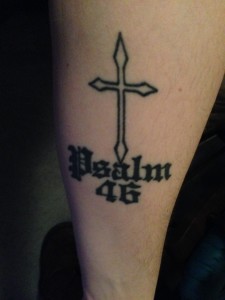 Once associated only with motorcycle and street gangs, tattoos have now become a part of main-stream society. Nearly four-in-ten Millennials have a tattoo (and for most who do, one is not enough: about half of those with tattoos have two to five and 18% have six or more). Many Christ-followers are actually getting inked as a sign of their faith.
Once associated only with motorcycle and street gangs, tattoos have now become a part of main-stream society. Nearly four-in-ten Millennials have a tattoo (and for most who do, one is not enough: about half of those with tattoos have two to five and 18% have six or more). Many Christ-followers are actually getting inked as a sign of their faith.
As I began to reflect on what appears to be a complete reversal of Christians views concerning tattoos, I wanted to know what made tattoos so taboo? Was there a biblical interpretation that once supported the prohibition of tattoos, but has changed with time, or was it simply the association of tattoos with rebellion that outlawed them from the church?
So, I went around the web looking for websites to find the answers. It didn’t take too long to find several people who still make a case against tattoos.
Their arguments center around two passages:
Leviticus 19:28
You shall not make any cuttings in your flesh for the dead, nor print any marks upon you: I am the LORD.
The practice of tattooing has been around for thousands of years. We know that from mummies found in ancient Egypt, and from Otzi the Iceman who was discovered in the Italian Alps in 1990. Early forms of tattooing was called scarification which was achieved through cutting the body, and rubbing the wound with ink, ash, or some other marking product. Scarification can also be achieved through burning the skin with a hot iron.
In ancient times, tattooing was always associated with religious beliefs and practices. Leviticus 19 is a call for God’s people to be distinct from the culture of their day. This passage includes a list of many prohibitions including: talking to a spiritual medium, wearing clothing made of two types of materials, cutting of facial hair, cuttings in the flesh and tattoos.
The cuttings in your flesh and body markings seem to be in reference for those who have died. The phrase “for the dead” could refer simply to the cuttings, or for both cuttings and tattooing. Old Testament manuscripts make it difficult to know with certainty in this passage; and therefore, translations must make decisions based on our limited knowledge of Ancient Hebrew, and friendliness to the English reader. I believe that the contextual evidence reveals that the phrase “for the dead” refers to both types of body markings.
Tattoos in this time period were linked to pagan religions. Many bible commentators believe that it was not the cutting of flesh or markings that were wrong, but their connection with death rites of foreign religions. Having a tattoo would make it appear as if the Jews were mourning the dead. This connection is no longer clear in today’s society just like clipping the beard mentioned in verse 17.
Leviticus 19 calls us to be distinct from pagan religious influences and culture that surround us. Christians should beware of some cultural norms that support pagan religious beliefs, but I do not believe it prohibits followers of Jesus to get inked.
I Corinthians 3:16-17
Don’t you know that you yourselves are God’s temple and that God’s Spirit dwells in your midst? If anyone destroys God’s temple, God will destroy that person; for God’s temple is sacred, and you together are that temple.
Life is precious, and the human body is important. God calls His people to take care of the body in various passages in the New Testament including: 1 Timothy 4:8, 1 Corinthians 10:31, and 3 John 1:2.
Modification to the body was not outlawed among the Jewish people. Circumcision was practiced among God’s people, and was done to male children at an early age in order to identify themselves as God’s people (Genesis 17). While the early church no longer required this to be identified as God’s people (Acts 15), circumcision remains apart of western culture.
For this reason, it is hard to say that getting a tattoo is destroying God’s temple. The point of this passage is that we should be good stewards of our body as something that has been entrusted to us. I believe that a more relevant application for today is that Christians should keep it healthy through healthy diet, exercise, and medical treatment.
 While tattoos are not taboo in our culture, I believe that marking the body with sinful messages, and anything identified with pagan religions is wrong. Tattoos that are hate-filled, or demeaning to others are also wrong.
While tattoos are not taboo in our culture, I believe that marking the body with sinful messages, and anything identified with pagan religions is wrong. Tattoos that are hate-filled, or demeaning to others are also wrong.
Godly character and biblical values should come into the decision-making process if a Christian gets inked.
While I don’t see them as prohibited by God, you probably won’t see one on my body. I want one on my fore arm, but my forearms are too skinny to draw that much attention to. I also won’t get one because my mother (who was raised in a different generation) would probably cry.
So maybe one day, when my forearms get huge, and my mother has gone on to heaven, I will get inked.
 Dr. G. David Boyd is the Founder and Managing Director of EA Resources, a non-profit designed to help churches and parents work with emerging adults. He has no tattoos, but once gave his brother a tattoo with a set of permanent markers.
Dr. G. David Boyd is the Founder and Managing Director of EA Resources, a non-profit designed to help churches and parents work with emerging adults. He has no tattoos, but once gave his brother a tattoo with a set of permanent markers.





